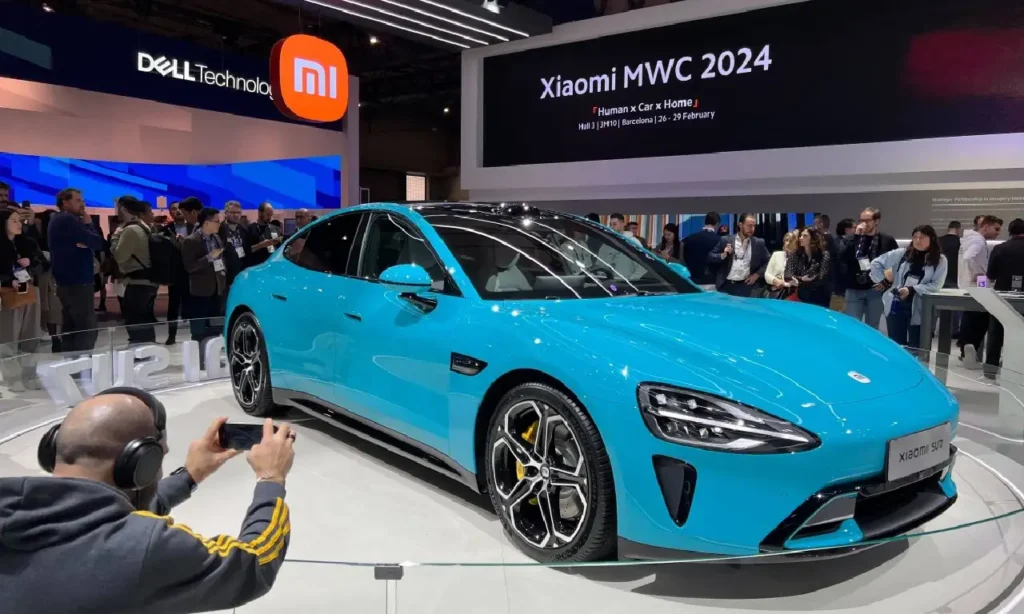In a groundbreaking move that underscores the dynamic shifts within the global tech and automotive industries, Xiaomi, A Chinese Phone Maker Did Something Apple Couldn’t, Xiaomi has successfully launched its first electric vehicle (EV), the SU7. This achievement starkly contrasts with Apple’s recent decision to abandon its long-anticipated autonomous EV project, Project Titan.
Xiaomi’s Ambitious Leap
Xiaomi’s entry into the EV market represents a significant pivot from its core business of smartphones and consumer electronics. The SU7 unveiled at the end of 2023, is a testament to Xiaomi’s ambition and capability. The company has invested heavily in this new venture, committing over $1.4 billion and assembling a dedicated team of 3,400 engineers.
The SU7: A Closer Look
The Xiaomi SU7 is available in three variants: Standard, Pro, and Max, each designed to cater to different performance and range needs.
- Standard Version:
- Power: 220 kW motor with 400 Nm of torque.
- Battery: 73.6 kWh BYD Blade battery.
- Range: 700 km (435 miles) CLTC.
- Performance: 0-100 km/h in 5.28 seconds, top speed of 210 km/h.
- Price: Starting at 215,900 yuan (approximately $30,500).
- Pro Version:
- Power: Similar to the Standard but with enhanced battery capacity.
- Battery: 94.3 kWh CATL battery.
- Range: 830 km (516 miles) CLTC.
- Price: 245,900 yuan.
- Max Version:
- Power: Dual-motor setup producing 495 kW (663 hp) and 838 Nm of torque.
- Battery: 101 kWh CATL Qilin battery.
- Range: 800 km (497 miles) CLTC.
- Performance: 0-100 km/h in 2.78 seconds, top speed of 265 km/h.
- Price: 299,900 yuan (around $39,600).
Advanced Features and Autonomous Driving
Xiaomi’s SU7 is not just about performance; it is packed with advanced technology. The SU7 Max, for instance, incorporates Xiaomi’s proprietary autonomous driving technology, Xiaomi Pilot Max, which uses a combination of vision and lidar technology. Nvidia’s Drive Orin chips power this system and include features like adaptive mapping and City NOA, a city-based pilot-assisted driving system.
Market Impact and Competitive Pricing
Xiaomi has strategically priced the SU7 to be highly competitive in the EV market, significantly undercutting rivals such as Tesla. For instance, the top-tier SU7 Max is priced at less than a third of a Porsche Taycan in China, making it an attractive option for consumers.
Despite its competitive pricing, the SU7 does not compromise on quality or features. It offers impressive driving dynamics, advanced autonomous driving capabilities, and fast charging technology. For example, the SU7 Max can achieve a range of 550 km with just 15 minutes of fast DC charging.
Apple’s Strategic Shift
In contrast to Xiaomi’s aggressive entry into the EV market, Apple has recently decided to shelve its autonomous EV project, known as Project Titan. Despite years of development and significant investment, Apple has redirected its focus towards other emerging technologies, such as artificial intelligence and mixed reality. This strategic shift indicates a reassessment of priorities, with Apple deeming these areas more strategic for its future growth.
Conclusion
“A Chinese Phone Maker Did Something Apple Couldn’t” Xiaomi’s successful launch of the SU7 EV highlights its capability to innovate and diversify beyond its established consumer electronics business. This achievement also underscores the rapid advancements of Chinese tech companies in the global EV market, posing significant competition to established players.
As Xiaomi expands its footprint in the automotive industry, it will be interesting to observe how it leverages its technological prowess and competitive pricing to capture market share. Meanwhile, Apple’s strategic pivot suggests a cautious approach, focusing on areas where it sees the greatest potential for innovation and growth.
In this unfolding narrative, Xiaomi has achieved something Apple couldn’t—bringing a sophisticated, competitively-priced electric vehicle to market.




